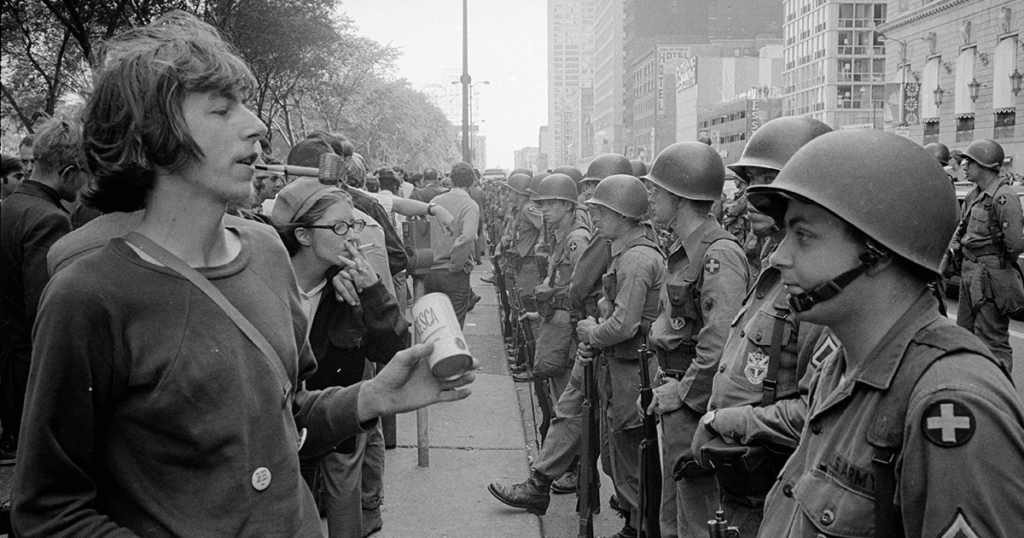
Amid all the hot, languid days of late August, melting together into a lifetime’s haze of forgotten moments, what happened exactly a half-century ago will never fade: I’m tightly holding the hand of a girl I’ve only just met, fleeing the searing sensation of tear gas, coughing and wheezing, caught up in the crowd stampeding out of Grant Park down Michigan Avenue.
You didn’t have to be there, as I was—at the 1968 Democratic Convention, August 26-29, in Chicago—to feel the exhilarating terror of the tear gas or the billy-club-wielding policemen. “The whole world is watching,” chanted the protesters, playing for the television cameras. And you didn’t have to be among the demonstrators to anticipate what would become the enduring meaning of “Chicago 1968”—a generational imprint, a Baby Boomer synecdoche, shorthand for the volatile mix of Vietnam War dissent, police overreaction, the media’s power, and the young-versus-old divide that superseded national identity.
Just days earlier, on the night of August 21, Soviet tanks had rolled into Czechoslovakia—bringing a violent end to that county’s experiment in “socialism with a human face.” In what became known as the “Prague Spring,” Alexander Dubček’s government had–for four short months—allowed free speech and loosened state controls over the economy. Now the streets of Chicago felt like Prague, and “Clean Gene” McCarthy was our very own Dubček.
After Robert F. Kennedy’s assassination in June, American youth invested their antiwar energy in the U.S. senator from Minnesota. But more a poet than a politician, McCarthy lacked RFK’s ruthless tenacity. Like Dubček, McCarthy never really had a chance against the power dynamics of The Establishment. Even before the convention commenced, delegate counters could tell that Hubert H. Humphrey, Lyndon B. Johnson’s vice president, would easily become the Democratic Party’s presidential nominee. The action–the drama!–would thus not be on the convention floor but in the streets, where protesters still thought history could be altered.
“Don’t give up! Please. It isn’t right,” I wanted to cry when encountering McCarthy in an elevator at the Conrad Hilton. He was with the poet Robert Lowell. From both men, I sensed a resigned air of academic detachment and irony, as if giving voice to current politics and the country’s fate was to be avoided. So the conversation turned to small talk and Lowell’s visit to my college campus the year before; he allowed that he thought he remembered me, but I’m sure he didn’t. What, he wanted to know, was I doing in Chicago?
Toying with the press badge dangling from my neck, I explained that I was doing legwork for Scripps-Howard Newspapers, where I had briefly worked before being drafted into the Army. I had taken annual leave in order to come to Chicago, but the Army didn’t know I was here. As the door opened to their floor, they smiled and one of them softly said, “A true participant-observer.”
I don’t think I ever threw away those “Chicago 1968” press credentials. To such keepsakes, I should add my pink pussyhat from the D.C. Women’s March the day after President Trump’s Inauguration: two fitting bookends to a half century of American protest. But it was the counter-inaugural “Peace Ball” at the Smithsonian’s National Museum of African American History and Culture two nights earlier, on January 19, 2017, that, quite unexpectedly and emotionally, dispatched me to Chicago 1968.
The Washington, D.C., streets were empty of vehicular traffic, barricaded, lined with portable toilets in preparation for Trump’s inaugural parade. In evening dresses and black-tie, we Peace Ball attendees emerged from subway stations to a deserted capital. Idling police cruisers, with rooftop lights flashing, lined our way to the museum. The only sound was the click-clack of high heels on pavement—eerie echoes in an abandoned, post-apocalyptic city—and I suddenly felt as if I was back in Chicago on August 29, 1968, the convention’s last, mostly ceremonial, night.
Many of the demonstrators and delegates had already gone home. Now almost alone in the convention hall’s once-crowded press box, I reflected on the outcome that had been foretold: Humphrey was the nominee; Edmund Muskie, the senator from Maine, his running mate. Yes, the show was over. The game was up. The story had ended. Hope had left the venue. Resignation remained the only response; and irony—as Lowell and McCarthy knew—offered the best palliative.


